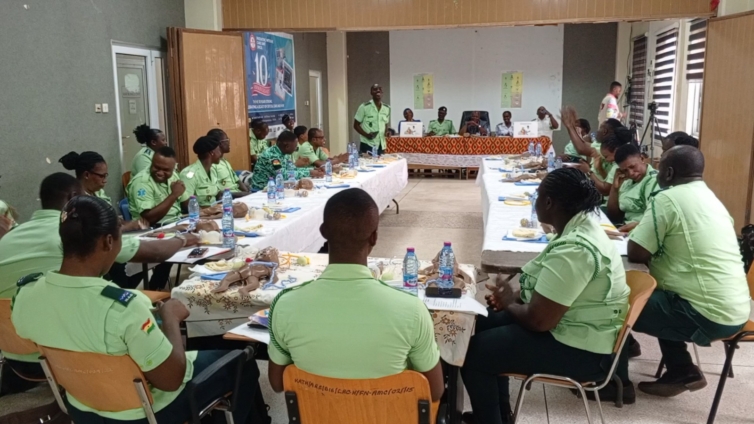The National Ambulance Service is scaling up the capacity of its staff across the country to better attend to neonatal cases.
The Emergency Medical Technicians of the Service are undergoing neonatal care training that leads to a more robust and responsive emergency medical system.
Officials say infrastructural and personnel development remain critical in addressing resource scarcity, even with the current system of one ambulance per constituency.

In a bid to throw weight on neonatal emergency services, the National Ambulance Services has begun a nationwide training program to enhance the skills of personnel of the National Ambulance Service (NAS).
The “Helping Babies Breathe” special training targets 500 Emergency Medical Technicians in the first phase, to equip them with the necessary skills to resuscitate newborns experiencing breathing difficulties at birth.
The training is attended by all including intermediate, advanced, and senior EMTs under the Ashanti Regional Health Directorate.
CEO of the National Ambulance Service, Professor Ahmed Nuhu Zakariah, emphasized the need to turn attention to children's emergency care.
“Our paramedics and emergency medical technicians are more skilled in providing care for adults than for neonates. The neonatal population is often neglected or forgotten. Hence, the 'Helping Babies Breathe' project has become a concept of paramount importance.

“We decided to partner with an international counterpart to introduce this program across the nation. The objective is that by the end of the program, all beneficiaries will be trained with the needed skills. We're starting with 500, but our target is everyone,” he said.
This training comes at an essential period to bridge critical gaps in the emergency services of neonates and acknowledge the broader issues plaguing Ghana's ambulance services.
Ghana, with a population of over 33 million, has a number of ambulances acknowledged to be inadequate.
The country currently has a ratio of one ambulance to over 200,000 people, falling short of WHO’s recommended one to 50,000 people.
Professor Zakariah, recounting strides made into the service, called for investments in the ambulance services to improve emergency services.
“The national services have progressed over the years. We have scaled up from 297 stations across the country. We’ve been able to establish the only paramedics and emergency care school in West Africa. Now all 16 regional capitals have dispatch centers. But there have also been challenges. We still need more resources. We need investment in emergency services,” he said.
Participants will learn from experienced trainers and share knowledge on best practices to elevate their performance and contribute significantly to NAS's success.
"Personally the sector is new to me, and so today’s session is unique, the expectation is high. The highlight is that, its a trainer of the trainer, meaning, what we learn here would be transferred to our colleagues who are not here," he said.
Latest Stories
-
Responsibility should be our ignition, not the pain of a tragedy — June 3 disaster survivor Akosua Ogyiri
15 minutes -
Wontumi visits NPP head office after release, expresses gratitude to party supporters
24 minutes -
Ghanaian forward Kelvin Boateng joins Austria Wien on four-year deal
25 minutes -
Garu NDC youth protest against leadership style of their MP
38 minutes -
OSP treats Ken Ofori-Atta like a ‘common criminal’ – Kwabena Agyapong fumes
50 minutes -
New players at Unity Cup will give Black Stars coach ‘a headache’ – Faisal Chibsah
1 hour -
Finance Minister inaugurates SSNIT Board, warns against politically-motivated asset sales
1 hour -
Ghana’s small-scale gold exports overtake large-scale for the first time – GoldBod CEO
1 hour -
DigiVibe targets gender-inclusive economic development and digital transformation in Ghana
2 hours -
BoG targets loan defaulters in new regulatory measures
2 hours -
Ghana’s 5G rollout is unlocking a new digital era with safe, shared infrastructure
2 hours -
Goldbod rakes in $1.17bn after first full month – Finance Minister
2 hours -
Walewale MP to establish state-of-the-art recording studio to boost creative art and fight drug abuse menace
2 hours -
Ato Forson signs ¥402m grant agreement with Japan to boost human capital development
2 hours -
Bunkprugu Paramount Chief officially gazetted after 18-year legal battle
2 hours

